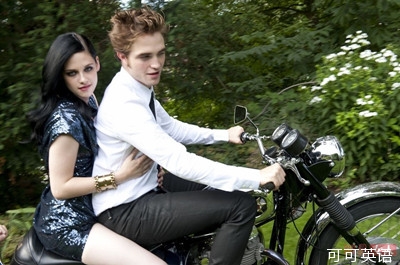His eyes narrowed. "More theories?"
他的眼睛瞇縫起來(lái)。“又有理論了?”
"Mm-hm." I chewed on a small bite of the bread, trying to look indifferent.
“嗯哼。”我咬了一小口面包,試圖讓自己的表情顯得淡漠些。
"I hope you were more creative this time… or are you still stealing from comic books?" His faint smile was mocking; his eyes were still tight.
“我希望你這次能更有創(chuàng)造性些……或者,你還在竊取漫畫書(shū)里的理論嗎?”他淡淡的笑容里充滿了嘲諷,但他的眼睛依然緊繃著。
"Well, no, I didn't get it from a comic book, but I didn't come up with it on my own, either," I confessed.
“嗯,不是,我不是從漫畫書(shū)里看到的,但我也不是自己想出來(lái)的。”我供認(rèn)道。
"And?" he prompted.
“還有呢?”他催促著。
But then the waitress strode around the partition with my food. I realized we'd been unconsciously leaning toward each other across the table, because we both straightened up as she approached. She set the dish in front of me — it looked pretty good — and turned quickly to Edward.
但這時(shí)候,那個(gè)女招待又繞過(guò)那堵隔墻,拿著我的食物大步走過(guò)來(lái)。我意識(shí)到我們兩個(gè)都無(wú)意識(shí)地從桌子上向?qū)Ψ娇窟^(guò)去,因?yàn)楫?dāng)她走過(guò)來(lái)的時(shí)候我們都退回去坐直了身子。她把菜放到我面前——看起來(lái)相當(dāng)?shù)孛牢丁缓箫w快地轉(zhuǎn)過(guò)身去面向愛(ài)德華。
"Did you change your mind?" she asked. "Isn't there anything I can get you?" I may have been imagining the double meaning in her words.
“您改變主意了嗎?”她問(wèn)道。“真的沒(méi)有什么我能為您效勞的嗎?”我已經(jīng)開(kāi)始想象她話里的雙重含義了。
"No, thank you, but some more soda would be nice." He gestured with a long white hand to the empty cups in front of me.
“不用了,謝謝。不過(guò),最好再拿點(diǎn)蘇打水過(guò)來(lái)。”他用纖長(zhǎng)雪白的手向我面前的空杯子做了個(gè)手勢(shì)。
"Sure." She removed the empty glasses and walked away.
“沒(méi)問(wèn)題。”她拿上那兩個(gè)空杯子,走開(kāi)了。
"You were saying?" he asked.
“你剛剛說(shuō)到?”他問(wèn)道。
"I'll tell you about it in the car. If…" I paused.
“我會(huì)在車?yán)锔嬖V你的。如果……”我停了下來(lái)。
"There are conditions?" He raised one eyebrow, his voice ominous.
“還有條件?”他挑起一側(cè)眉頭,聲音里充滿了不祥的預(yù)兆。
"I do have a few questions, of course."
“當(dāng)然,我確實(shí)有幾個(gè)問(wèn)題要問(wèn)。”
"Of course."
“當(dāng)然。”
The waitress was back with two more Cokes. She sat them down without a word this time, and left again.
那個(gè)女招待又拿著兩瓶可樂(lè)回來(lái)了。這次她放下東西,什么也沒(méi)說(shuō),又離開(kāi)了。
I took a sip.
我喝了一小口可樂(lè)。
"Well, go ahead," he pushed, his voice still hard.
“好了,繼續(xù)說(shuō)。”他敦促著我,聲音依然緊繃著。
I started with the most undemanding. Or so I thought.

《暮光之城》
與圖書(shū)題目相得益彰的是,“暮光之城”系列別具匠心的封面設(shè)計(jì)則很好地傳達(dá)出了每本書(shū)內(nèi)在的深遠(yuǎn)寓意。斯蒂芬妮·梅爾指出《暮色》封面上的蘋果代表“創(chuàng)世紀(jì)” 內(nèi)善惡樹(shù)上的禁果。象征貝拉和愛(ài)德華之間人類與吸血鬼禁忌的愛(ài)戀。在書(shū)的開(kāi)頭引用了“創(chuàng)世紀(jì)”217頁(yè)的內(nèi)容:“只是分別善惡樹(shù)上的果子,你不可吃,因?yàn)槟愠缘娜兆颖囟ㄋ馈!边@同時(shí)也代表了貝拉如何分辨善惡——選擇是否吃下那顆禁忌的果實(shí),這比喻了選擇跟愛(ài)德華在一起或遠(yuǎn)離他。











